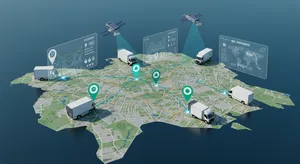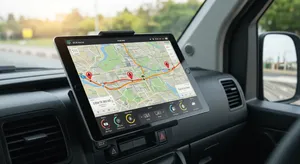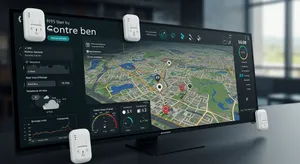Key Components
- GPS tracking devices with cellular connectivity
- Fleet management software platform
- Mobile applications for field operations
- Data analytics and reporting tools
- Real-time monitoring capabilities
This page contains GPS tracking information. Use the table of contents to jump to specific sections. FAQ sections can be expanded using Enter or Space keys.
The commercial GPS tracker landscape transforms fleet operations through data-driven decisions and real-time monitoring. Fleet managers gain visibility into vehicle locations, driver behavior, and operational efficiency.
Commercial GPS trackers serve as the foundation for modern fleet operations. These systems combine hardware devices, software platforms, and data analytics to provide detailed vehicle monitoring.

Commercial GPS trackers provide continuous location updates every 30-60 seconds. Fleet managers monitor vehicle positions on digital maps with satellite and street view options. The system records speed, direction, and stop duration data.

AI algorithms analyze fleet data to refine route planning and resource allocation. The system identifies inefficient patterns and suggests improvements. Machine learning adapts recommendations based on historical performance.

Customizable alerts monitor speed violations, idle time, and harsh driving events. Managers receive instant notifications through email, SMS, or mobile apps. The system tracks response times and resolution status.

Advanced algorithms calculate optimal routes based on traffic, distance, and delivery windows. The system adjusts routes in real-time to avoid delays. Historical data improves future route efficiency.

Running commercial vehicles means dealing with regulations and safety requirements. A commercial GPS tracker helps you stay compliant and keep everyone safe without the constant stress.

Data is only valuable if you can understand it and act on it. Your commercial GPS tracker turns all that tracking information into reports that actually help you make smarter business decisions.

Your commercial GPS tracker should work with your existing business tools, not replace them. The best systems integrate seamlessly and adapt to how you actually run your operation.

Here's what you really want to know - how much does this cost, how long does it take to set up, and when will you start seeing your money back? A commercial GPS tracker should pay for itself quickly.

Commercial GPS trackers are accurate within 3-5 meters under normal conditions. Accuracy depends on satellite visibility, weather conditions, and device quality. Most commercial-grade trackers provide location updates every 30-60 seconds with consistent precision for fleet management needs.
Monthly costs for commercial GPS tracking typically range from $20-50 per vehicle depending on features and service level. Basic tracking starts around $20/month while advanced fleet management with analytics costs $35-50/month per vehicle. Most providers offer volume discounts for larger fleets.
GPS tracker installation takes 15-25 minutes per vehicle when performed by professional technicians. Installation is done while vehicles are parked to avoid downtime. Most fleets are fully operational within a week of signing up, including training and system setup.
Yes, most commercial GPS trackers integrate with dispatch software, accounting systems, and customer management tools through APIs. Data flows automatically between systems to eliminate double entry. Custom integrations are available for unique business requirements.
Most companies see ROI within 3-6 months through fuel savings, improved productivity, and reduced insurance costs. A typical 8-vehicle fleet saves $12,000-$25,000 annually. Fuel savings alone often cover monthly tracking costs before counting other benefits.
Commercial GPS trackers work in most weather conditions including rain, snow, and extreme temperatures. Heavy cloud cover or severe storms may temporarily affect satellite reception. Quality commercial devices are weatherproof and designed for continuous outdoor operation.
Geofencing creates virtual boundaries around specific locations using GPS coordinates. When vehicles enter or exit these zones, the system sends instant alerts via email, SMS, or mobile app. Geofences help monitor customer visits, unauthorized use, and operational compliance.
Yes, commercial GPS systems monitor speeding, harsh braking, rapid acceleration, and idle time. Driver behavior reports help identify training needs and improve safety. Most companies see 40-50% reduction in accidents within the first year of implementation.
When GPS signal is lost, trackers store location data internally and transmit it when signal returns. Most devices have backup cellular connectivity and can operate for hours without satellite connection. Critical alerts are still sent when cellular service is available.
Contract requirements vary by provider. Some offer month-to-month service while others require 12-36 month agreements for better pricing. Longer contracts often include free hardware and installation. Compare total costs including equipment, installation, and monthly fees when evaluating options.
GPS tracking uses minimal data, typically 1-5 MB per vehicle per month. Data usage depends on update frequency and features enabled. Most cellular plans easily accommodate GPS tracking without significant cost impact.
Professional GPS trackers include tamper alerts and backup power sources. Removal attempts trigger immediate notifications to fleet managers. Hidden installation locations and hardwired connections make unauthorized removal difficult.
Hardwired GPS trackers operate indefinitely from vehicle power. Battery-powered units typically last 2-4 weeks depending on reporting frequency. Most commercial applications use hardwired devices for continuous operation.
Professional installation of GPS trackers does not void vehicle warranties when installed correctly. Certified technicians follow manufacturer guidelines and use proper connection methods. Installation documentation protects warranty coverage.
GPS tracking provides valuable evidence for insurance claims including accident reconstruction, theft recovery, and driver behavior analysis. Many insurers offer discounts for fleets using GPS tracking systems.
Commercial GPS tracking uses encrypted data transmission and secure cloud storage. Access controls limit data visibility to authorized personnel. Regular security audits and compliance certifications protect sensitive information.
GPS trackers require minimal maintenance with typical service life of 5-7 years. Software updates occur automatically over cellular connections. Hardware replacement is scheduled based on device age and performance monitoring.
Advanced GPS systems monitor fuel consumption through engine diagnostics and driving behavior analysis. Fuel reports identify inefficient routes, excessive idling, and aggressive driving that increases consumption.
GPS tracking systems automatically adjust for time zones based on vehicle location. Reports and alerts display in local time zones or can be configured for specific business time zones across multi-state operations.
Comprehensive training includes system navigation, report generation, alert configuration, and troubleshooting. Training is provided through online tutorials, live demonstrations, and ongoing support resources for all user levels.